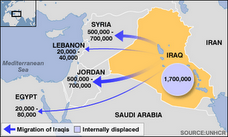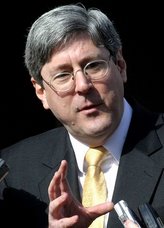By Benedict Carey, THE NEW YORK TIMES
Published: May 6, 2007
The detailed mental health survey of troops in Iraq released by the Pentagon on Friday highlights a growing worry for the United States as it struggles to bring order to Baghdad: the high level of combat stress suffered during lengthy and repeated tours.
The fourth in a continuing series, the report suggested that extended tours and multiple deployments, among other policy decisions, could escalate anger and increase the likelihood that soldiers or marines lash out at civilians, or defy military ethics.
That is no small concern since the United States’ counterinsurgency doctrine emphasizes the importance of winning the trust and support of the local population.
The report was provided in November to Gen. George W. Casey Jr., then the senior American commander in Iraq.
Pentagon officials have not explained why the public release of the report was delayed, a move that kept the data out of the public debate as the Bush administration developed its plan to build up troops in Iraq and extend combat tours. Rear Adm. Richard R. Jeffries, a medical officer, told reporters on Friday that the timing was decided by civilian Pentagon officials.
The survey of 1,320 soldiers and 447 marines was conducted in August and September of 2006. The military’s report, which drew on that survey as well as interviews with commanders and focus groups, found that longer deployments increased the risk of psychological problems; that the levels of mental problems was highest — some 30 percent — among troops involved in close combat; that more than a third of troops endorsed torture in certain situations; and that most would not turn in fellow service members for mistreating a civilian.
“These are thoughts people are going to have when under this kind of stress, and soldiers will tell you that: you don’t know what’s it’s like until you’ve been there,” said Dr. Andy Morgan, an associate clinical professor of psychiatry at Yale University who has worked extensively with regular and Special Operations troops. “The question is whether you act on them.”
The Pentagon’s analysis also identified sources of anger besides lengthy and repeated deployments that could lead to ethics violations, which would not be apparent from the outside: eight-day rest breaks that involved four days of transit; long lines to get into recreation facilities, especially for those who perform missions outside the relative safety of base camps; and inconsistent dress-code rules.
Most of all, there were uncertainties about deployment: 40 percent of soldiers rated uncertain redeployment dates as a top concern.
The military has evaluated the emotional state of soldiers in the past, from the cases of shaking and partial paralysis known as shell shock after World War I, to the numb exhaustion identified as combat fatigue in World War II. The flashbacks and irritability reported in the years after the Vietnam War came to define another diagnosis: post-traumatic stress disorder.
(more, click blog title above.)
Sunday, May 6, 2007
Subscribe to:
Post Comments (Atom)





No comments:
Post a Comment